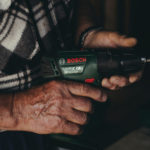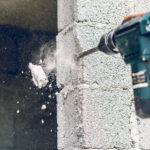Learning how to use tools effectively is quite a smart investment, and using the right tools can make all the difference in elevating the quality of your work. When it comes to drilling bits, cobalt and titanium drill bits are two of the favorite bits in the market. They are designed to be tougher and durable, meaning they can work fine for a long period of time.
A drill is a great multi-purpose tool that can help you complete a number of projects. However, when picking the right high-speed steel drill bit, choosing between cobalt and titanium can be overwhelming. This is because they can be used for a lot of the same projects. All in all, you can leverage their features to do your work efficiently.
Cobalt and titanium drill bits are better than the other at specific tasks. In this article, you will learn about each of the two drill bits to see which one you should consider for your project.
What is a Cobalt Drill Bit?
Cobalt drill bits are high-speed steel (HSS) bits made of alloy steel with cobalt content. They are usually around 5% to 8% cobalt, with the rest being steel. While they are all extremely tough, they are all graded differently, depending on the amount of cobalt content. For instance, grade M42 has approximately 8% cobalt, and grade M35 has about 5% cobalt.
Because the cobalt is added to the alloy steel, cobalt drill bits tend to be harder than their titanium cousins. They are very tough bits and work well for all sorts of metals, including the most rigid ones like cast iron and stainless steel.
Furthermore, they can withstand high temperatures and retain the sharpness of the cutting edges, allowing for higher cutting speeds under extreme conditions. Cobalt is known to dissipate heat over the contact surface very quickly, even at top speeds.
As for sharpening, you can resharpen the cutting edges of your cobalt drill bits pretty easily. Even better, sharpening them doesn’t lower the quality of their edges because they do not have a coating.
What is a Titanium Drill Bit?
Titanium drill bits are bits made of high-speed steel with titanium nitride coating. The coating gives these bits the ability to withstand very high temperatures and wear, making them incredibly durable.
Typically, there are three types of titanium coating used to coat titanium drill bits:
- Titanium nitride (TiN): This is the entry-level coating, and bits with this coating usually have a bright gold color.
- Titanium Carbo-nitriding (TiCN): Relative to TiN, this coating is harder and delivers higher wear resistance. Drill bits with this coating are blue or purple in color and deliver relatively better permanence than TiN.
- Titanium aluminum nitrate (TiAlN): Bits with this coat are violet in color and can withstand very high temperatures, up to 800°C. At high temperatures, they develop a layer of aluminum oxide that reflects the heat back onto the drill chips, allowing for higher cutting speeds.
While titanium drill bits are made to drill tougher materials, they work better for softer materials like soft metals, wood, and plastic. Of significance, they can lose their coat, which can drastically impact their heat resistance over time.
When sharpening titanium drill bits, the coating comes off. Over time, this coating may wear off completely, causing the bit to lose much of its heat resistance. For this reason, they have a shorter lifespan than cobalt drill bits.
How to Choose a Drill Bit?
From building furniture to renovating your house, there are plenty of projects that require the use of a drill. While you can buy a drill bit set with a variety of drill bits, for most projects, you will need to pick the right drill bit for the work.
Here are some of the things to consider when choosing a drill bit for your next project:
Type
While many drills are multipurpose, there are different types of drill bits out there designed to complete different types of projects. The best drill bit for you will depend on what exactly you want to do.
Precisely, there are wood drill bits, metal (HSS) drill bits, multi-purpose drill bits, and job-specific drill bits. If you can get a multipurpose bit that is ready to go through tough and soft surfaces, you will have a handy tool.
Comparing cobalt vs. titanium bits, cobalt drill bits tend to be tougher and work well for most surfaces.
Size
After choosing the right type of drill bit, the next thing you should consider is size. Drill bits come in a variety of sizes. Obviously, the size you need will depend on the size of the hole you want to make.
Some projects require you to make holes of varying sizes, so make sure to pick a variety as well. Most drill bit sets come with the most commonly used sizes, so variety might not be a big issue.
Material
The material used in making drill bits determines its strength, ultimately the material it can cut through. Sometimes manufacturers apply a coating to drill bits to enhance their durability and protect them from heat.
Comparing cobalt vs. titanium, cobalt drill bits are made to last and offer great value for money compared to titanium drill bits. They are also incredibly versatile and have broader applications than their titanium cousins.
Shape
Drill bits come in different shapes that determine how they will drill through different material surfaces. Different drill bits will make clean holes on the surfaces if they are used correctly.
Differences Between Cobalt vs Titanium Drill Bits
Cobalt and titanium drill bits are both designed to drill through metal easily. They are, therefore, more tough and durable than most of the other drill bits in the market. However, these drill bits have their differences when compared closely.
It is not automatic that one drill bit will be the overall best choice for anyone seeking to buy drill bits. They serve differently depending on situations and projects for which one intends to use the drills.
Here is a comparison based on material, cost, sharpening, use, and temperature:
1. Material
The cobalt drill bits are made up of cobalt mixed with a steel alloy, with cobalt content contributing 5% to 8% of the entire drill bit. This makes cobalt drill bits very strong and tough enough to go through the hardest material out there, including cast iron and stainless steel.
The cobalt part of the material is meant to prevent overheating when the drill is spinning against other metals.
Even if you handle the drill bits with unprotected hands, you may not feel the heat produced affect your working efficiency or effectiveness.
In comparison, titanium drill bits are not made with titanium material alone; instead, they are made of a metal core and then coated with titanium. Basically, the titanium coat is designed to prevent overheating while using the titanium bits, even though it does not contain any cobalt deposits.
The type of material used to make each of these drill bits differs greatly, but in functionality, you might probably not realize any difference. They serve their functions as expected and can only be separated from each other based on the material in a few circumstances.
2. Cost
Cobalt drill bits are quite more expensive compared to other options in the market. However, they are trusted in durability and will last longer than other drill bits. Therefore, when you choose to buy a cobalt bit, you will spend a lot of money at first purchase, but in the long run, you will have saved since the expensive tool will last for longer periods.
Typically, cobalt bits provide a good value for their high cost since they are durable. The choice of whether you are going to buy a cobalt drill bit or not will depend fully on your preference of spending a lot now rather than later.
Titanium drill bits are cheaper than cobalt drill bits for the first market price. However, they become more expensive in the long run because the titanium coating fades off. The durability of these bits is limited to the time when the coat starts to shade off.
Remember, the coat is essentially added to prevent overheating of the core. When it shades off due to wear and tear, it is hard to handle the drill bits due to the overheating effect. Still, if you need to drill a small number of holes, the cheap titanium drill bit is good for you.
If you are planning to drill metals over long periods, you should try to avoid the titanium drills to avoid incurring more repetitive costs.
3. Sharpening
Cobalt drill bits can be sharpened easily because they have no coating. When sharpening, no surface will strip off, thus giving it a long lifespan. You can sharpen the cobalt bits many times before they completely become unusable.
In comparison, titanium blades have a coating that wears off as it gets to work frequently. Sharpening a titanium drill bit only enhances the rate at which the coat comes off. You can only sharpen the blades a few times, and they become useless due to their loss of heat resistance.
They actually have a short lifespan, and sharpening will only reduce the lifespan to a worse time you could ever expect.
4. Temperature
Cobalt blades dissipate heat easily, especially at the contact surface. Even though rubbing metals together will produce heat, when cobalt is rubbed against another metal, it dissipates off the heat so fast even when the rubbing is done at high speeds. None of the blades will get too hot when using cobalt drill bits.
For titanium drill bits, the titanium coating is responsible for dissipating heat. This coating dissipates the heat produced due to drilling or rubbing along its surface.
Therefore, the metal core does not get too hot to stop you from working anytime you need to use it. The problem comes in when the coating starts to wear out. Once it wears out, the bit may become ineffective.
5. Uses
Cobalt drill bits are tougher and can be used for a wide range of drilling works. It is more cost-effective when used on hard materials like tough steel alloy, hardened steel, and weld seams.
On the other hand, titanium drill bits are used for lighter jobs because they may wear out easily and fail to dissipate heat. Use these drill bits on wood, copper, aluminum, mild steel, brass, and cast iron.
Frequently Asked Questions
Can You Use Cobalt Drill Bits in Wood?
While you technically use cobalt drill bits in wood, you run the risk of splitting the wood. For this reason, you have to be very cautious every time you elect to use cobalt in wood.
Further, cobalt drill bits are also expensive; therefore, using them to drill wood is not cost-effective.
Can You Sharpen Titanium Drill Bits?
Yes, you can. However, sharpening titanium drill bits can cause the useful coating to come off, which can damage the drill bits.
Is Titanium Good for Drill Heads?
Titanium is an ideal material for drill heads as titanium drill bits are high-speed steel (HSS) drill bits and great from general-purpose drilling. Drill bits with titanium coating are very hard with higher heat resistance.
Is Cobalt or Titanium Stronger?
Cobalt tends to be relatively harder than titanium. For this reason, cobalt drill bits work pretty well for drilling tougher material surfaces, such as stainless steel and cast iron.
Are Cobalt Drill Bits Worth It?
Yes. Cobalt drill bits are highly durable, versatile, and can be sharpened when blunt, meaning they can be used for a longer time. Precisely, they are worth every penny.
How Strong is Titanium Compared to Steel?
Titanium is as strong as steel but 45% lighter, which makes it far superior.
When Should You Use a Titanium Drill Bit?
Titanium drill bits are great for general purpose drilling because they drill quickly. Titanium bits would help you drill aluminum, magnesium, wood, and PVC smoothly and efficiently.
Can Cobalt Drill Bits Be Sharpened?
Yes, you can sharpen cobalt drill bits without experiencing any issues. Unlike titanium bits, cobalt is added into the alloy steel, and sharpening the drill bit doesn’t affect it except making it sharper.
Conclusion
The most obvious difference between titanium and cobalt drill bits is that cobalt is used to create the entire drill bit, whereas titanium is used as a coating for the tip. The main advantage of titanium bits is their cost, as they are less expensive than their cobalt counterparts.
On the other hand, cobalt drill bits are incredibly tough, durable, and versatile.
If you’re looking for a drill bit designed to go through tough material surfaces, cobalt bits are an ideal choice. Titanium bits, on the other hand, are an ideal choice if you want to make smooth holes through wood.




